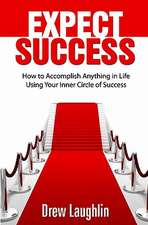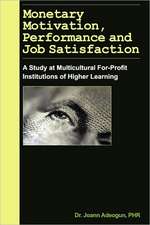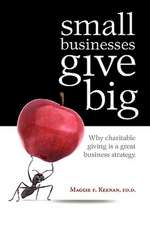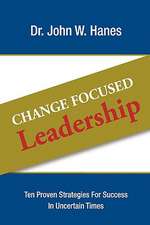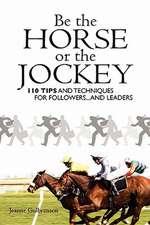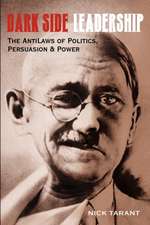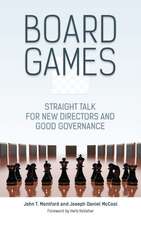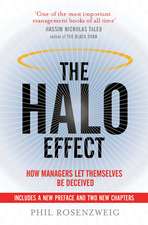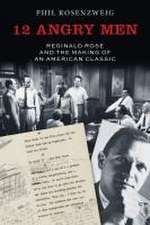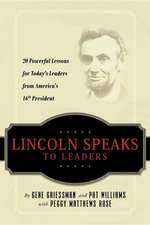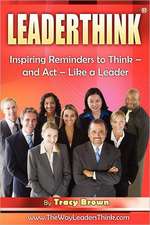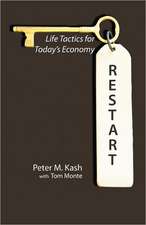Left Brain, Right Stuff: How Leaders Make Winning Decisions
Autor Phil Rosenzweigen Limba Engleză Paperback – 4 feb 2015
| Toate formatele și edițiile | Preț | Express |
|---|---|---|
| Paperback (1) | 58.57 lei 3-5 săpt. | |
| Profile – 4 feb 2015 | 58.57 lei 3-5 săpt. | |
| Hardback (1) | 232.59 lei 3-5 săpt. | |
| PublicAffairs – 6 ian 2014 | 232.59 lei 3-5 săpt. |
Preț: 58.57 lei
Preț vechi: 69.83 lei
-16% Nou
Puncte Express: 88
Preț estimativ în valută:
11.21€ • 11.73$ • 9.27£
11.21€ • 11.73$ • 9.27£
Carte disponibilă
Livrare economică 15-29 martie
Preluare comenzi: 021 569.72.76
Specificații
ISBN-13: 9781781251362
ISBN-10: 1781251363
Pagini: 336
Dimensiuni: 130 x 196 x 24 mm
Greutate: 0.24 kg
Ediția:Main
Editura: Profile
Colecția Profile Books
Locul publicării:London, United Kingdom
ISBN-10: 1781251363
Pagini: 336
Dimensiuni: 130 x 196 x 24 mm
Greutate: 0.24 kg
Ediția:Main
Editura: Profile
Colecția Profile Books
Locul publicării:London, United Kingdom
Notă biografică
Phil Rosenzweig has been a marketing manager for Hewlett-Packard and a Professor at Harvard Business School. Currently he is a Professor at IMD, where he works with leading companies on questions of strategy and organisation. He has taught extensively in executive programs around the world. He is the author of the best-selling The Halo Effect.
Recenzii
Phil Rosenzweig has a gift for puncturing conventional business nostrums with hard data and critical analysis. And for writing business books that you can actually read for pleasure.
This fine book argues that the accepted tenets of behavioural economics are inadequate when dealing with strategic decisions ...The gripping stories neatly reveal the true complexity that is not captured in laboratory experiments, and put a needed reality-check on the standard dogma of decision-making. Essential reading.
Left Brain, Right Stuff will help (force) you to rethink what you thought you knew about behaviour and decision-making. It will show you how to avoid the traps that have been set by some very popular (and dangerously erroneous) writings on the topic. This book will surprise you, it will challenge your (and your colleagues') thinking in a very productive way, and it will be fun to read. Read it twice: once for the enjoyment of it, and once for pragmatic applications. It is certain to provoke the right kinds of discussions within your management team, and to raise your organization's hit rate for effective decision-making.
With compelling accounts and research results, Phil Rosenzweig take us through the world of big, strategic decisions. They are thorny, complex, and risky, and he shows that they require analytic thinking, intuitive judgment, and personal confidence without certitude. Left Brain, Right Stuff delivers an invaluable framework for making good and timely decisions by all who sit in a leadership chair.
Left Brain, Right Stuff intrigued me on a number of levels. By parsing strategic situations, Rosenzweig convinces that we control more than we think we do. Go one more step - by believing in ourselves, we increase the probability of a great outcome. Then add in what happens in 'winner takes all' environments and the need to assess relative performance (not objective performance), and my eyes were opened wide.
No one thinks as clearly - and writes as clearly - as Phil Rosenzweig does about the diagnostic challenges of assessing the quality of business judgment and about the prescriptive challenges of improving it.
This fine book argues that the accepted tenets of behavioural economics are inadequate when dealing with strategic decisions ...The gripping stories neatly reveal the true complexity that is not captured in laboratory experiments, and put a needed reality-check on the standard dogma of decision-making. Essential reading.
Left Brain, Right Stuff will help (force) you to rethink what you thought you knew about behaviour and decision-making. It will show you how to avoid the traps that have been set by some very popular (and dangerously erroneous) writings on the topic. This book will surprise you, it will challenge your (and your colleagues') thinking in a very productive way, and it will be fun to read. Read it twice: once for the enjoyment of it, and once for pragmatic applications. It is certain to provoke the right kinds of discussions within your management team, and to raise your organization's hit rate for effective decision-making.
With compelling accounts and research results, Phil Rosenzweig take us through the world of big, strategic decisions. They are thorny, complex, and risky, and he shows that they require analytic thinking, intuitive judgment, and personal confidence without certitude. Left Brain, Right Stuff delivers an invaluable framework for making good and timely decisions by all who sit in a leadership chair.
Left Brain, Right Stuff intrigued me on a number of levels. By parsing strategic situations, Rosenzweig convinces that we control more than we think we do. Go one more step - by believing in ourselves, we increase the probability of a great outcome. Then add in what happens in 'winner takes all' environments and the need to assess relative performance (not objective performance), and my eyes were opened wide.
No one thinks as clearly - and writes as clearly - as Phil Rosenzweig does about the diagnostic challenges of assessing the quality of business judgment and about the prescriptive challenges of improving it.


